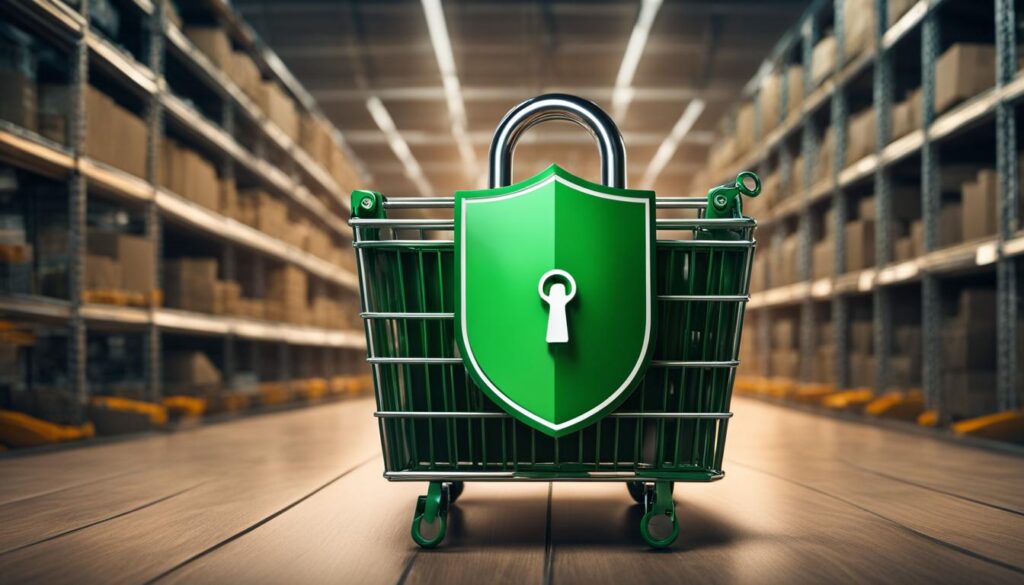We may earn money or products from the companies mentioned in this post.
Welcome to our comprehensive guide on E-commerce Security and Trust. In today’s digital age, online shopping has become an increasingly popular way for customers to purchase goods and services. However, with this convenience comes the potential for security breaches and fraud, making it crucial for online businesses to prioritize E-commerce Security and Trust. In this guide, we will explore various strategies and tools that you can implement to ensure a safe shopping experience for your customers, gain their trust, and protect their sensitive information.
Key Takeaways:
- E-commerce Security and Trust are crucial for the success of your online business.
- Implementing the right strategies and tools can help protect your customers’ sensitive information.
- Secure payment gateways and trust badges can boost customer confidence and increase conversions.
- Website security measures like secure login systems and protection against malware and hacking attempts can strengthen your online store’s security.
- Protecting customer data is essential, and adhering to privacy regulations is critical for building customer trust.
Understanding the Importance of E-commerce Security
As an e-commerce business, it’s crucial to prioritize the security of online transactions and protect your customers’ sensitive information. Implementing effective security measures can also boost customer confidence and trust in your online store.
Secure Online Transactions
One of the primary risks associated with e-commerce is the possibility of online fraud. Fraudsters can use stolen credit card information to make purchases, leaving your customers with financial losses and a negative perception of your business. Implementing fraud prevention measures, such as two-factor authentication and IP address verification, can reduce the risk of online fraud and ensure secure online transactions for your customers.
Customer Data Protection
Protecting your customers’ personal information is of utmost importance. Cybercriminals can steal this information to commit identity theft or other malicious activities. By implementing a secure checkout process, encrypting sensitive information, and adhering to privacy regulations, you can ensure customer data protection and establish trust with your customers.
Website Security
Website security is also critical to ensuring a safe and secure online shopping experience. Cyber-attacks, such as malware infections and hacking attempts, can compromise your website and put your customers’ information at risk. Implementing secure login systems, regularly updating software and plugins, and conducting routine security audits can help strengthen your website security and prevent security breaches.
In summary, prioritizing e-commerce security through fraud prevention measures, customer data protection, and website security can help you establish a safe and trustworthy shopping environment, boost customer confidence, and protect your business from cyber threats.
Implementing Secure Payment Gateways
When it comes to e-commerce, the security of online transactions is paramount. To ensure that your customers’ financial information is protected during the checkout process, it’s crucial to implement secure payment gateways. One popular method for accomplishing this is through the use of SSL certificates.
SSL (Secure Sockets Layer) certificates are digital certificates that create a secure connection between a customer’s web browser and your online store. The SSL certificate encrypts sensitive information, such as credit card details, so that it cannot be intercepted by hackers or other third parties.
Implementing SSL certificates on your website is a fairly simple process. First, you’ll need to purchase an SSL certificate from a reputable certificate authority. Most web hosting companies offer SSL certificates as part of their hosting plans. Once you have obtained the SSL certificate, you’ll need to install it on your website’s server. This typically involves generating a Certificate Signing Request (CSR) and providing it to your web hosting provider for installation.
| Benefits of implementing secure payment gateways with SSL certificates: |
|---|
| Increased customer confidence: Displaying a padlock icon or “https” in the website address bar indicates to customers that your online store is secure, which can increase their confidence in making a purchase. |
| Reduced risk of data breaches: SSL certificates encrypt customer data during transmission, making it more difficult for unauthorized parties to intercept and steal it. |
| Improved search engine rankings: Google includes website security as a ranking factor in search results. Implementing SSL certificates can help to improve your website’s search engine rankings. |
Overall, implementing secure payment gateways with SSL certificates is a crucial step in protecting your customers’ financial information and building trust with them. By taking the necessary steps to ensure a secure checkout process, you can provide a safe shopping experience that will encourage customers to return to your online store.
Displaying Trust Badges and Certifications
Building trust with your customers is crucial for a successful e-commerce business. Displaying trust badges and certifications, such as SSL certificates, on your website can boost customer confidence and increase conversions.
Tip: Choose trust badges that are recognizable to your customers, such as those issued by well-known security companies or industry organizations.
Studies show that trust badges can make a significant impact on customer behavior. According to a survey by Baymard Institute, 18% of online shoppers abandoned their carts due to concerns about payment security. However, when trust badges were displayed, the cart abandonment rate decreased by 17.4%.
There are several types of trust badges you can display on your website:
| Badge Type | Description |
|---|---|
| SSL Certificates | Indicate that your website has a secure connection and that data transmitted between your customer’s browser and your server is encrypted. |
| Payment Processor Badges | Indicate that your payment process is secure and that customer data is protected by the payment processor. Examples include PayPal, Stripe, and Visa. |
| Security Badges | Indicate that your website has been scanned for vulnerabilities and is regularly monitored for security threats. Examples include McAfee SECURE and Norton Secured. |
When displaying trust badges, it’s important to ensure they are prominently placed on your website, such as near the top of the page or in the footer. Additionally, avoid using too many badges, as this can overwhelm customers and make them feel suspicious.
Strengthening Your Website Security
Website security is a crucial aspect of maintaining a secure shopping experience for your customers. Hackers and cybercriminals are always on the lookout for vulnerabilities they can exploit to gain access to your website and steal sensitive information. Therefore, adopting robust website security measures is crucial to safeguarding your online store.
Secure Login Systems
One of the key steps you can take to enhance website security is to implement secure login systems. This involves introducing multi-factor authentication measures, such as two-factor authentication and CAPTCHAS, to prevent unauthorized access to your site. Additionally, you can limit login attempts and require strong passwords to further enhance login security.
Regular Software Updates
Regularly updating your website’s software is another vital aspect of strengthening its security. Updates often include important security patches that address known vulnerabilities, reducing your site’s exposure to potential threats. It’s essential to keep all software, including your website’s content management system, plugins, and themes, up to date to ensure maximum security.
Protection Against Malware and Hacking Attempts
Malware and hacking attempts can easily compromise your website’s security, putting your customers’ sensitive information at risk. Implementing robust anti-malware software and firewalls can help safeguard your site against these threats. Additionally, performing regular security scans and backups can help detect and prevent potential security breaches before they can cause significant harm.
Table: Comparison of Website Security Features
| Feature | Basic Plan | Advanced Plan |
|---|---|---|
| Secure Socket Layer (SSL) Encryption | No | Yes |
| Advanced Firewall Protection | No | Yes |
| Regular Software Updates | No | Yes |
| 24/7 Malware Scanning and Removal | No | Yes |
| Backups and Restore Points | No | Yes |
As shown in the table above, upgrading to an advanced security plan can significantly enhance your website’s protection against potential threats, providing peace of mind to both you and your customers.
Protecting Customer Data
As an e-commerce business owner, protecting your customers’ personal information is crucial for building trust and ensuring their loyalty. By implementing a secure checkout process and encrypting sensitive information, you can prevent data breaches and maintain your customers’ privacy. Here are some measures you can take to protect customer data:
Implement a Secure Checkout Process
One of the most important steps you can take to protect your customers’ data is to implement a secure checkout process. This involves using HTTPS encryption, a secure protocols that encrypts communication between your website and your customer’s browser, and SSL/TLS certificates, which enable secure data transfer.
| Benefits of a Secure Checkout Process | Risks of a Non-Secure Checkout Process |
|---|---|
|
|
Encrypt Sensitive Information
In addition to implementing a secure checkout process, you should also encrypt any sensitive information that is collected from your customers, such as credit card numbers, addresses, and phone numbers. Encryption involves converting this information into a code that can only be decrypted with a key, making it more difficult for hackers to access and steal this data.
“Encrypting sensitive information is like placing it in a locked safe. Only those with the key can access it, and even if someone manages to break into the safe, they won’t be able to read the contents.”
By prioritizing customer data protection and implementing a secure checkout process, you can ensure a safe and trustworthy shopping experience for your customers, which will ultimately drive sales and help your e-commerce business thrive.
Conclusion
It is crucial to prioritize e-commerce security and trust for the success and longevity of your online store. By implementing secure payment gateways, displaying trust badges, strengthening website security, and protecting customer data, you can establish a safe and trustworthy shopping environment that will attract and retain loyal customers.
Secure Payment Gateways
Secure payment gateways, such as SSL certificates, play a vital role in protecting your customers’ financial information during the checkout process. By setting up these gateways, you can offer a seamless and secure payment experience for your customers.
Displaying Trust Badges
Displaying trust badges, such as SSL certificates, on your website can significantly increase customer confidence and encourage them to make a purchase. These badges act as visual cues that indicate that your website has been verified and is safe for transactions.
Strengthening Website Security
Improving website security is crucial to protect against hacking attempts, malware, and other types of cyber-attacks. To ensure a secure shopping experience, consider implementing secure login systems, regular software updates, and protection against malware.
Protecting Customer Data
Safeguarding your customers’ personal information is a top priority. To protect customer data, you must implement a secure checkout process, encrypt sensitive information, and adhere to privacy regulations. By doing so, you can establish trust with your customers and ensure their information is safe.
By following these strategies and tools, you can create a safe and trustworthy e-commerce environment that will enhance your business’s reputation and attract loyal customers.
FAQ
How can I ensure the security of my e-commerce website?
To ensure the security of your e-commerce website, you should implement secure payment gateways, display trust badges and certifications, and strengthen your website security measures. Additionally, it is important to protect customer data by implementing a secure checkout process and encrypting sensitive information.
What risks are associated with online transactions?
Online transactions come with risks such as fraud, identity theft, and unauthorized access to sensitive customer information. It is crucial to have robust security measures in place to mitigate these risks and protect both your customers and your business.
How do secure payment gateways work?
Secure payment gateways, such as SSL certificates, encrypt customers’ financial information during the checkout process. This ensures that sensitive data, such as credit card details, is transmitted securely between the customer’s browser and the payment processor, protecting it from interception by hackers.
What are trust badges and why are they important?
Trust badges are visual symbols, such as SSL certificates or security seals, displayed on a website to indicate that it is safe and trustworthy. They can boost customer confidence and increase conversions by assuring visitors that their personal information will be protected and their transactions will be secure.
How can I strengthen my website security?
To strengthen your website security, you should implement secure login systems, regularly update your software and plugins, use firewalls and intrusion detection systems, and regularly scan for malware. Additionally, it is important to have a backup system in place to recover your website in case of a breach.
What measures can I take to protect customer data?
To protect customer data, you should implement a secure checkout process that encrypts sensitive information, such as credit card details. It is also important to comply with privacy regulations, regularly audit your data security practices, and educate your employees on data protection best practices.
Why is prioritizing e-commerce security and trust essential?
Prioritizing e-commerce security and trust is essential to ensure the success and longevity of your online store. By demonstrating that your website is secure and trustworthy, you can attract and retain loyal customers who feel confident in making purchases from your store, leading to increased sales and customer satisfaction.
Affiliate Disclosure: This post may contain affiliate links. If you purchase through our link, we may receive a small commission, but at no additional cost to you. For more information, please see our Disclosure statement.



